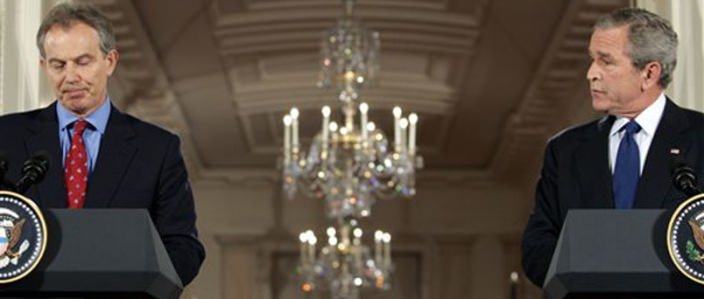 Politics
Politics
A Coalition of the Unwilling
Mar 7, 2007 While America is still begrudgingly coming to terms with the climate crisis, British politicians, scientists and newspapers have been shouting from the rooftops for years. So why is the U.S. so far behind its closest ally? Truthdig foreign correspondent Sarah Stillman spoke with more than 20 experts to find out. 1 2 3 4 5Nothing screams "I (heart) global warming" quite like a stroll around Capitol Hill in your halter top at Christmastime. I speak from experience; this past holiday season, high on Coppertone and early-blooming cherry trees, I found myself all too eager to tryst with the infamous 21st-century menace -- never mind that he'd recently melted the heart of the Ayles Ice Shelf, screwed 2,000 polar bears in the Beaufort Sea and sweet-talked the pasty male congressional interns into bearing their chests on the National Mall in mid-winter. Do I regret my indulgence? No. Have I repented? Yes. My cure? A blustery island called Great Britain.
When I returned to my new flat in the UK after the holidays to discover freakish winds that chapped my lips and trapped my neighbor under a pile of scaffolding until the local authorities could dig him out several hours later, the symbolism wasn't lost on me. If America lubed up my climate change romanticism, the motherland was having nothing of it. In their mass media, the British have long favored unambiguous front-page headlines like "Global Warming May Kill Millions" over manufactured debates about whether climate scientists are the millennial Chicken Littles. In their elected government, they share a cross-party consensus on the need for urgent action, as evinced by Prime Minister Tony Blair's ambitious pledge to cut UK carbon emissions at least 60 percent by 2050. And in their national temple to intellectual argumentation -- the pub -- the Brits' carbon-conscious banter flows as freely as Old Hooky. In fact, it was around the stained oak tables of Oxford's Eagle and Child that I first noticed my British peers' dexterity in the lingo of "eco-footprints" and "carbon sequestration" that put me and my American friends to shame.Whereas my job as a freelance journalist is typically to write my way around my ineptitude, on this particular occasion I would like to write about it. The question was simple when I pitched it to my editor several months ago: Why are the Brits kicking our arse on climate change awareness? That was back when news of a 14 percent reduction in perennial Arctic sea ice cover was relegated to the footnotes of The New York Times, and when the Republican-ruled Congress still boasted a prime soapbox for Sen. James Inhofe's (R-Okla.) diatribes against the liberal "hoax" of greenhouse gases. But times they are a-changing. Now that the crisis has exploded into the mainstream U.S. press upon the release of the Intergovernmental Panel on Climate Change report in February -- and with Oscar-adorned Al Gore suddenly hedging his bets for a Nobel Peace Prize, Snoop Dogg rapping for the cause, and even our recalcitrant commander in chief promising a spankin' new climate agenda -- America appears to be reaching its tipping point.
My original question about the U.S.-UK climate divide hasn't disappeared in this new landscape; it's simply proved more complicated and urgent than I'd first imagined: Why did the Brits catch the climate change bug several years before the America public, and has this pop trend really translated into meaningful policy? What makes a troubling environmental truth take hold of a nation's psyche -- earning that coveted "stickiness factor" to which Malcolm Gladwell traces all revolutions of consciousness? And how can we ensure that America's recent attempts to close the climate change gap translate into immediate action -- individually, culturally and politically -- on both sides of the Atlantic this year?
I decided to consult more than 20 climate change scientists, politicians, journalists and environmentalists for answers. And the insights they shared form a surprisingly coherent picture, even if it looks less like one of Gore's tidy Power Point slides and more like an epidemiologist's tangled causality web: Scientific research breaks through to the mass media (or doesn't); the media transform pop culture; public opinion tilts political leadership; political leadership stocks the coffers of new scientific research; and the circle goes 'round again, ricochets, darts sideways and globalizes. What follows is a tour of three major strands from this web that seem worth splicing, since they allow us to look beyond the symptoms of climate apathy in order to address its underlying practical and philosophical structures.
Next Page: A Nation of "Once-lers": the Strand of Addiction



You need to be a supporter to comment.
There are currently no responses to this article.
Be the first to respond.